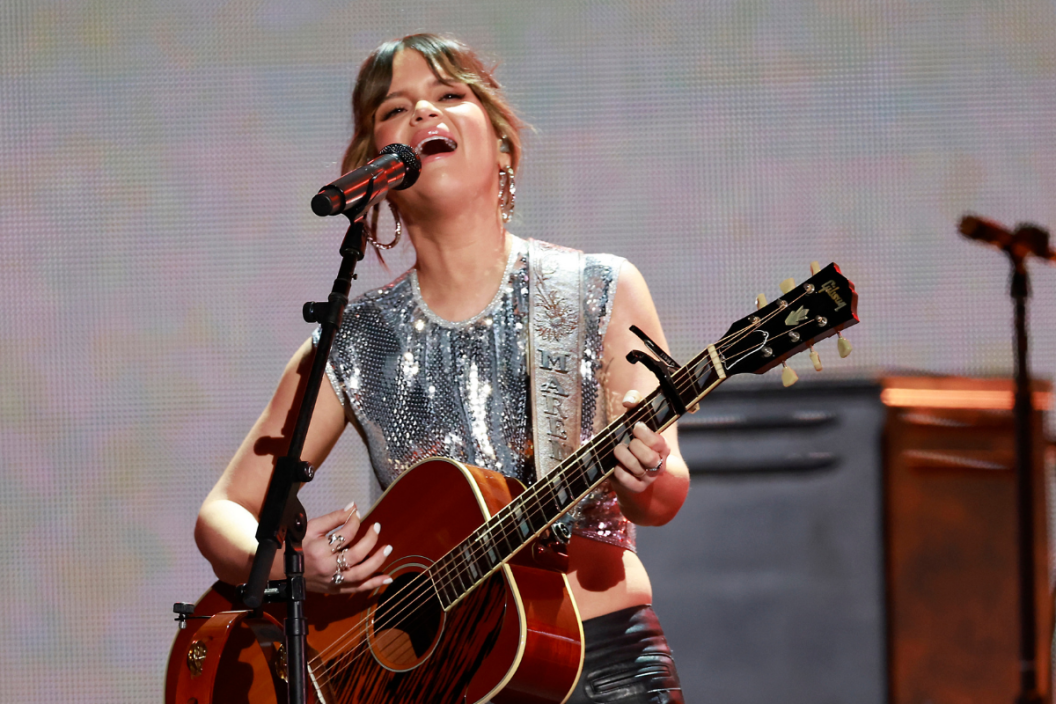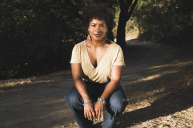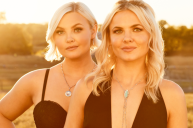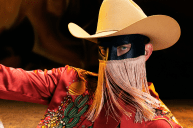Country music remains a dominant influence on the pop charts, with the likes of Kacey Musgraves, Maren Morris and Mickey Guyton sitting on top as the most successful crossover artists. But even though pop radio has welcomed all these artists with open arms, country radio hasn't always been too friendly to them.
Marissa R. Moss, a music journalist who has covered country music in Nashville for over a decade, goes deep on country radio's history of blackballing its female artists in her first book Her Country: How the Women of Country Music Became the Success They Were Never Supposed to Be. Moss traces country music's integration into pop music, from its '90s crossover boom until The Chicks were virtually ousted for speaking out against the Bush administration. Country still has this "shut-up-and-sing" attitude towards silencing women, with country radio only playing female artists 16% of the time, but Her Country also celebrates how women are thriving in spite of it all and making room for more diversity in the genre.
Below, read Wide Open Country's interview with Moss about her experience covering the country music industry in Nashville, what inspired Her Country and where country can go from here.
Wide Open Country:
In your afterword, you talk about how this book was inspired after you moved from New York to Nashville, but you didn't really have much of a connection to Nashville. But then you started reporting on country music and got involved in the local scene — Was there one defining moment or a point in time where you realize you had to tell the story of all these women in country music today?
Marissa Moss:
I'd been on this beat for a while. And to some degree, it hadn't quite yet occurred to me to turn it into a book. Probably imposter syndrome if we're being honest, but once I sort of started thinking about the history, what we have in terms of history, to kind of show or speak to country music from this time period. I really thought more seriously about why a book like this would be important. I mean, because if you look at like the Billboard Country Airplay charts, and you look at the top artists for the past 20 years, you're not going to get really anyone that's mentioned in this book. So it felt important to tell the story of country music that you weren't going to get just by looking at what was played on the radio.
WOC:
Her Country lays out the history of country music's gradual integration into pop music — going back to the '90s boom led by the likes of LeAnn Rimes, Shania Twain and The Chicks, and also country radio's history of blackballing its female artists. Would you agree that country music is worse for women now than it was 30 years ago?
MM:
We have that really big boom in the '90s. In terms of these superstar crossover, women in country music like Shania (Twain), Trisha (Yearwood), The Chicks. Then we had this massive downturn in terms of representation of women on country radio. It was always something that really interested me in terms of figuring out exactly what happened other than country radio just being inherently misogynist. 90% of radio programmers are men. That's one side to it, but I was curious as to what was sort of maybe going on at like a slightly deeper level.
That's where I got into and I talked about this in the book about what happened after The Chicks, after 9/11. Country radio really fell in love with us super patriotic, often very jingoistic and sometimes racist songs. At that time women were putting out ballads or pop crossover songs and didn't have a place on radio playlists, and that set the scene for country radio's aversion to playing women today — so I'd agree it's gotten worse since then.
WOC:
I think that kind of goes into this idea that country music was always considered to be three chords in the truth. You even say in Her Country that country music is supposed to be about the truth, but just somewhere along the line that started to fissure. What do you think lead country music away from "the truth" towards the popular sanitized image it shows today?
MM:
Country music is big into the idea of "authenticity" and what what country music is "supposed to be." But just like pop music, it's all big business. Music Row in Nashville loves to portray this idea of homeliness and family and all these things country music wants to be about, but it's all about money at the end of the day.
The thing with Nashville and the country music industry is that when something works for them, they stick with it and it becomes impossible to change course. So when Toby Keith dropped a song like "Courtesy of the Red, White, and Blue" after 9/11 and it become a hit, Nashville got hooked on themes that are exclusionary and refuses to confront deeply embedded problems in a very straight white male norm.
WOC:
What I found really unique about Her Country was its insider look at country music as an industry, telling about how all these artists crossed paths at PR events, songwriting camps, awards shows, and going deep into the bureaucracy of country radio. There have been plenty of music biographies and boks that center around the artist, but the business of it all is rarely discussed. What made you want to take that point of view to expose these industry practices?
Marissa Moss:
It's all very important to me, and I'm glad you said that because I was afraid that it would get lost when talking about such major artists. But country music is a bit of a mystery to people that don't want to engage with it or don't like country music. The country music industry is such a machine, it's not this cute little club. There are so many systems involved, and it's a very unique industry. The songwriting community and all these things that make Nashville really special, Nashville can be a great place in a lot of ways, but I wanted to make sure to sort of position Music Row and country radio is like a bit of an antagonist to help people kind of understand where a lot of these problems originate from. If you can figure out where a problem originates from, you can do a better job at fixing it if you don't think it's totally out of your control. Oh, these things are well within our control.
WOC:
I feel like even Brandi Carlile talked about it in her memoir, about how country radio and the country music industry poises itself as something as an antithesis to pop music. As if Music Row is a bit more down to earth with real people singing real stories. But, like you just said, it's a money-making industry machine at the end of the day. So do you agree that pop music and country music industries are just the same monster with different clothes on?
MM:
Yeah, at least you know what you're getting in pop music; it doesn't hide it's capitalist motives. Country music likes to pretend we're a family and we support each other and everybody helps each other out, I don't know if people buy this sort of like innocent reputation or whatever. But it's just a business that is so dependent on, you know, discrimination and racism and all these various kinds of exclusion to keep it functioning. I'm not trying to point fingers, or maybe I am, but those are things that can be changed and fixed.
WOC:
You mentioned how country music can be a mystery to people who aren't really involved with it or have a history with it. It's kind of it can be a hard time getting people to accept it or just admit that they like country music, this "I'll listen to anything but country" kind of mindset. I know I used to have that same mindset before I really listened to artists like Kacey Musgraves and Maren Morris, and you said yourself that you didn't have a lot of connections before moving to Nashville. Do you think that you wrote Her Country to expose all these practices to people who already listened to country music, or did you want to help bring new audiences into country music?
MM:
I mean, both. But I think definitely very important to me was reaching people that thought that they didn't [or] couldn't see themselves in country music....whether as a listener or somebody who wants to work in the industry, a fan, a musician. That was really important to me, you know, bringing in those people that that thought that they weren't welcome, couldn't see themselves in it or weren't being spoken to.
I didn't always see myself in country music, but then it just starts with an earworm and then all of a sudden you can listen to lyrics a little bit more, hear the stories, and you can find yourself somewhere in it.
That's really exciting to me, like those moments where people say, "you know I really hated music, and then I discovered Micky Guyton,or I wasn't [relating] to country music, and then discovered Brandi Carlile. That is where music can kind of change lives. I'm really sentimental about music in general also, but that was definitely what was always in my mind. How would this book sit with someone who all they knew about country music was Morgan Wallen and Toby Keith?
Her Country: How the Women of Country Music Became the Success They Were Never Supposed to Be is available for purchase here.




